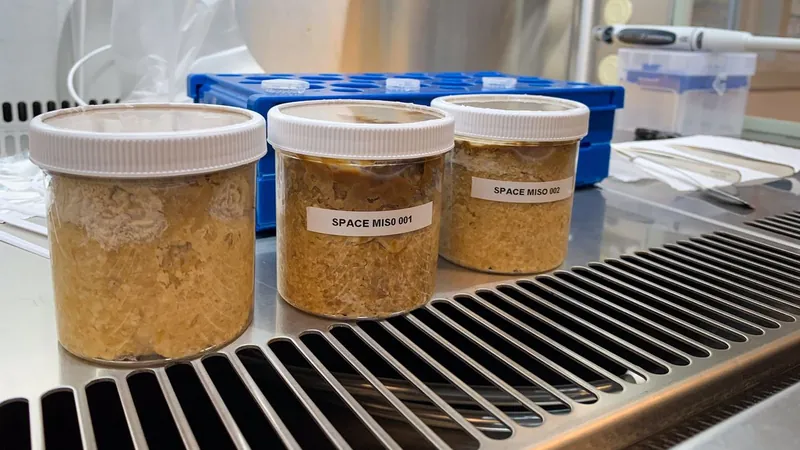
Astronauts Will Savor Nutty Miso From Space: A Flavor Revolution!
2025-04-02
Author: Wei
In a groundbreaking revelation, scientists announced on Wednesday, April 2, that they have successfully fermented miso aboard the International Space Station (ISS), marking a pivotal moment in space cuisine. This achievement represents the first intentional food fermentation conducted in an orbiting laboratory, and it holds promising implications for enhancing culinary experiences during long-term astronaut missions.
Miso, the staple Japanese condiment, is traditionally a fermented soybean paste crafted from cooked soybeans, salt, and koji—a specialized mold culture usually cultivated on grains like rice or barley. The fermentation process can vary widely in duration, spanning from a few months to several years, ultimately resulting in a rich, umami flavor that is a staple in soups, sauces, and a plethora of other dishes.
Interestingly, research has uncovered that astronauts often struggle with food intake in space, despite meals specifically designed to meet their nutritional needs. This is likely attributed to alterations in their taste perception, as astronauts have reported diminished senses of taste and smell while in orbit. Consequently, they tend to gravitate towards foods with bold flavors—namely salty, spicy, and umami-rich options.
The importance of food fermentation in this context cannot be understated, as it has the potential to mitigate some of these flavor challenges. While various fermented products, such as kimchi and wine, have previously been sent to the ISS, no fermentation activities had taken place in space until now. Leading the charge, Dr. Joshua Evans and his team from the Sustainable Food Innovation group at the Danish Technical University set out to investigate the feasibility of fermentation in the unique conditions of microgravity and assess how space-fermented foods compare to those produced on Earth.
In March 2020, the team dispatched a small container of high-koji, low-salt "miso-to-be" to the ISS, allowing it to ferment for an entire month before bringing it back to Earth. To establish a baseline for comparison, two additional batches of miso were prepared on Earth—one in Cambridge, Massachusetts, and the other in Copenhagen, Denmark—both using identical methods and kept frozen until the experiment commenced.
Upon returning the ISS miso to Earth, researchers meticulously analyzed its microbial communities, flavor compounds, and sensory characteristics. Their findings were reassuring: the space miso not only fermented successfully but also exhibited similar salty umami flavor profiles as its Earth counterparts. Additionally, the space miso revealed a distinct roasted, nutty flavor that researchers attributed to the effects of microgravity and the increased radiation exposure in low Earth orbit, which may have accelerated the fermentation process.
Dr. Evans expressed excitement over the study's implications, stating that these findings could pave the way for future culinary innovations in space. "Our study opens up new directions to explore how life changes when it travels to new environments like space," he remarked. "It could invite new forms of culinary expression, expanding and diversifying culinary and cultural representation in space exploration as the field grows."
As we venture further into the cosmos, the successful fermentation of miso could revolutionize food options for astronauts and inspire the creation of other flavorful fermented dishes in the future. Could this be the beginning of a bold new culinary era in space? Stay tuned!





 Brasil (PT)
Brasil (PT)
 Canada (EN)
Canada (EN)
 Chile (ES)
Chile (ES)
 Česko (CS)
Česko (CS)
 대한민국 (KO)
대한민국 (KO)
 España (ES)
España (ES)
 France (FR)
France (FR)
 Hong Kong (EN)
Hong Kong (EN)
 Italia (IT)
Italia (IT)
 日本 (JA)
日本 (JA)
 Magyarország (HU)
Magyarország (HU)
 Norge (NO)
Norge (NO)
 Polska (PL)
Polska (PL)
 Schweiz (DE)
Schweiz (DE)
 Singapore (EN)
Singapore (EN)
 Sverige (SV)
Sverige (SV)
 Suomi (FI)
Suomi (FI)
 Türkiye (TR)
Türkiye (TR)
 الإمارات العربية المتحدة (AR)
الإمارات العربية المتحدة (AR)